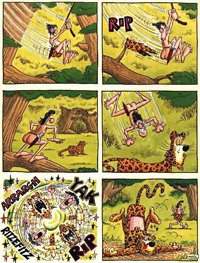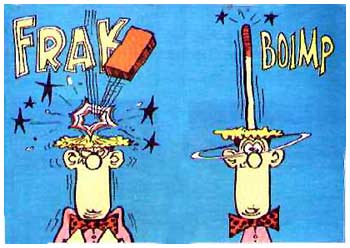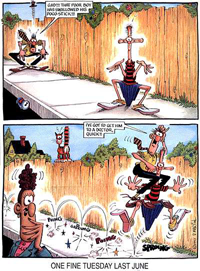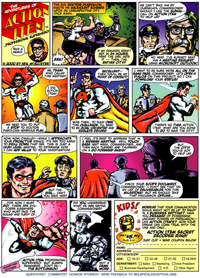Sunday, January 31: The A.D.D. Detective
BUZZWORDS– bang * splat!
by Leigh Lundin
From my eMail:
"… of the inspirational magickal leprechaun prayer chain. Forward this to 122 people in the next 15 seconds or you’ll be subject to liver spots, gout, a goiter the size of an iPad, Windows Vista, the collapse of the national economy, and the heartbreak of psoriasis."
Last quarter, not forwarding junk mail caught up with me and I spent more time in doctors’ offices than planned for the holidays. I resent eMails that typically feature 40 point pink and violet (and sometimes an entire color palette) italicized Zapf Chancery, animated unicorn GIFs, threats about breaking the chain, and a story about a waif on a snowy winter night who tried to sell matches to a druggist in Tupelo, Kansas, where the pharmacist didn’t buy any matches but her stiff fingers inspired him to invent a penile implant and donate proceeds to the National Phosphorus Institute.
All right, I admit a soft spot for Victorian art, but it has to be displayed in context and not accompanied by a threat the world will end in seven days.[1] Fortunately, my friend Thrush only occasionally forwards eMails and they are usually worthwhile. One of his recent notes resulted in today’s column: jargon.
TechnoSpeak
Technoese or technobabble (yes, that’s in the dictionary) is common in science and engineering circles, and no more so than in the computer industry. Even for those familiar with some facets, other aspects may seem foreign and incomprehensible. Those on the fringes accused the "wizards" and "priests" in the innermost circles of using nomenclature to keep others locked out.
That’s not the case. Like mathematics, once we move past real-world applications we slide into a nebula of abstraction. Software people make up words to either define abstractions or encapsulate ideas. For example, we use "byte" instead of saying "eight bits, each defined as a binary digit, 0 or 1". Because we deal in base 16 instead of decimal, we rattle off numbers like "zero one niner dog easy fox", which translates as "019DEF"– that’s actually a number!
Don Martin[2] School of Software
When debugging over the phone, we abbreviate to speed interminable repetition, much as computers do: The words "parenthesis, decimal point, variable, exclamation point, asterisk" would be spoken as "paren, dot, var, bang, splat". Although asterisks appear in almost every programming language, it’s amazing how few programmers can actually spell the word, since they usually either say "star" or "splat".
L33tSpeak: pr0n, u n00b
Beyond serious computing lies the shadowy world of hackers and crackers. Hackers are generally benign and are sometimes referred to as "white hats". The "black hats" are the crackers, those who intend harm to you, your bank, your business, or your country, as the Ukraine found a year or so ago.
Crackers and hackers use an ever-changing language deliberately intended to obfuscate and evade grokking and detection. Most is well understood now through mainstream sources, words such as phish (troll for scam victims), warez (pirated software and games), and pr0n (pornography). Occasionally authors such as Jeffrey Deaver take on this subculture, so if you’re planning to write such a book or article, Wikipedia has a reasonably current list.
Tech Writing
In the halcyon of software design before America gave away its computer industry to India, I brought in an intern from the University of Central Florida technical writing program. She was talented and I learned a lot from her as she wrote.
Most of her techniques are universal: Be conversational, use active voice, keep your point of view consistent, choose the best verbs and nouns and avoid modifiers.
She (and her advisor, also a woman) struck out every use of "she or he" and my colleague Kevin’s use of "s/he" and simply replaced them with "he". She said, "You can be politically correct or you can strive for smooth writing, but don’t expect both. If you use ‘s/he’ or even ‘she’, the readers will stop in mid-sentence and that’s not what you want them to do."
A couple of wrinkles tend to appear in technical writing more than other types. For example, second person crops up, particularly when giving instructions:
- Throttle back.
- Lower the flaps.
Most of all, technical writing requires precision. Specificity is paramount: What does some, a few, or many mean in or out of context? You don’t write "Wait a couple of seconds before deploying parachute," you particularize: "Wait two seconds before deploying parachute."
Leegalese
Writing with legalities in mind is in a class by itself. While usually attempting to convey information or instruction, its primary purpose is to protect the institution.
For example, Disney avoids the term "standard operating procedures" and instead uses "operating guides", OGs instead of SOPs. According to a vice president of Legal, the first implies legal expectations that the latter does not.
Legal-savvy speakers never refer to problems. "Issues" or "challenges", yes, "problems", never. Toyota is recalling millions of vehicles with faulty accelerators that have "issues", not problems. That creates "challenges" for dealers.
Even innocuous wording like the verb "must" becomes a concern. Instead of saying, "The operator must clear the ride before pressing Switch A," the O.G. will read "The operator sees to it the ride is clear before pressing Switch A."
BizSpeak
I can’t defend bizspeak, the jargon-ladened, mind-numbing, soul-deadening communications of bureaucracies everywhere that crushes meaning and life out of every sentence.
Most organizations have no diktat, but a perception that business documents should sound important drives the trend, and what implies gravitas more than lots of words? But wait– writers don’t want to get pinned down, so they make the words as meaningless as possible.
Take the word ‘stakeholder’. What the hell does it mean? It’s a pompous term for interested party, but when I hear the word, I want to hold a stake– over the beating heart of the corporate suit who uttered it.
At one time, I thought I might strangle the next middle manager who said "Run it up the flagpole (and see who salutes it)." Its use may be fading… I haven’t heard it in… days. Maybe we can get everyone on the same page.
To a bizspeak writer, words are like packing material… bulky, protective of the culture, and otherwise useless. To be a good author in any other genre, write the opposite of corporate communications: Trim the fat, use specific nouns and verbs, avoid meaningless jargon.
What can we as fiction writers learn? Here’s a practical tip created for today’s article. Consider the following sentence:
Santa is large in size, red in color, and fat in girth.
What’s wrong with this sentence other then the lack of a dynamic verb? Twice the verbiage. The sentence is bizspeak, but chop the filler words and you write:
Santa is large, red, and fat.
Next time you’re tempted to write "The meeting drug on in time," cut the fat and the wrong verb and simply write "The meeting dragged."
Action Comix
As I mentioned, Thrush started this article by sending me a link to Neil McAllister‘s ‘action hero’, Action Item, well worth a read.

1 In writing this article, a story from the 1950s, perhaps earlier, tickled my memory, but I couldn’t recall the title or author. The gist of the story was a letter (or book– not certain of the device) that turned up and whoever read it, subsequently died. The story probably inspired the horror novel The Ring (1995-2002). It touched the popular imagination at the time, particularly since the story never revealed the content. If you know the story, let me know! Thank you.
2 Ask any Mad Magazine reader about Zot! Splunch! Zzorbit! and they’re recognize master of sound effects, Don Martin. Without seeing the cartoon itself, you start picturing a frog in a pond, a mosquito, or an anteater. He was popular with foreign readers because many of his comics required no translation. Three of his strips are included here.

























“zero one niner dog easy fox”
You computer engineers are so ten minutes ago … it’s like watching a rerun of the original “Dragnet”.
For many years, the World War II-vintage American code words for letters of the alphabet have been supplanted by international ones: it should be “zero one niner delta echo foxtrot.”
That’s proper for, say, an airplane designation, but not hexadecimal. We know the international radiotelephony words, alpha, bravo, charlie, etc, but these are digits.
On the other hand, I KNOW you know that and are raggin’ on me because I picked on unicorns. Keeping me on my toes, huh?
Leigh, I liked Don Martin, but my favorite cartoonist of all time was Mad Magazine’s Mort Drucker. Remember him?
Not until you said the name, John, the backbone of Mad. (I can’t remember the cartoonist who did Spy vs Spy, either.)
Drucker individualized every face. He caricatured so many people in his panels, someone once said we had to wait for new people to be born.
Antonio Prohias created Spy vs Spy. Heaps of clips available on YouTube
Need anything else? Have your people call my people by C.O.B. and we’ll do lunch.
Because you picked on unicorns? What am I, a fourteen-year-old girl? I hate unicorns. Nasty goat-like creatures.
But picking on Santa Claus is just mean. Why say he’s fat when you’ve already said he’s large, anyway? It’s redundant.
Nice try with your “digits” argument, but that is an almost unbearably geekish excuse. Anyway, “alpha” is a letter in the Greek alphabet or the description of a dominant male in a group. The first letter in international radio telephony alphabet is “alfa” with an “f”.
(laughing) Touché.
By the way, I have an absolutely wonderful DVD-ROM titled “Absolutely MAD”. It contains every issue of MAD Magazine from 1952 through 2005.
Other favorite MAD artists of mine include the legendary Wally Wood, Dave Berg (“The Lighter Side of … “), Al Jaffee (famous for the MAD fold-in covers), and Sergio Aragonés, who drew all the little cartoons in the margins.
Ah, culture!
Santa Claus aside, I agree with everything you’ve said — personally I think this is your best column in months. I’ve often argued that the two deadliest enemies to good writing are euphemism on the one hand and hyperbole on the other.
Reportedly at Don Martin’s funeral, the eulogy included several of his sound effects from his cartoons. Shhhhliiickkkkkt!
Great column! Thank you!
Doit! Ponnnnnggg!
Great article Leigh. You covered the whole #!
When I read your article, I couldn’t remember any examples of legalese, and there were many, from the time I worked for the Social Security Administration.
However, The email message below that I received on Monday from the company who does online tax returns for the IRS shows the Federal government still prefers legalese.
The IRS has rejected your federal return. This means that your return has not been filed.
Here’s the reason for the rejection:
Error Code 0103: Form 1040/1040A/1040EZ – Total Federal Income Tax withholding shown on tax form must equal the sum of withholding on Other 1099 and AK Dividend, withholding from Schedule K-1, withholding on Form W-2, and W-2GU withholding on any Form 1099-R and withholding on Form W-2G. Exception: Do not reject when withholdings on the tax form exceed withholdings statements by $5.00 or less. identified as a Stimulus Payment return (special processing literal “ESP” in Form 1040A).
CB leads, others follow
http://news.yahoo.com/s/nm/us_office
The most annoying office jargon:
1. Thinking outside the box
2. Let’s touch base
3. Blue sky thinking
4. Blamestorming
5. Drill down to a more granular level
6. Let’s not throw pies in the dark
7. I’ve got that on my radar
8. Push the envelope
9. Bring your A-game
10. Get all your ducks in a row
BBB, you’re the cat’s pajamas. I can tell you’re a dame who likes to color outside the lines.